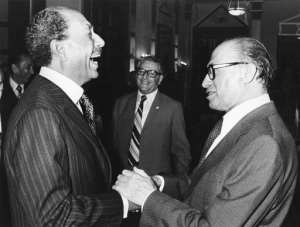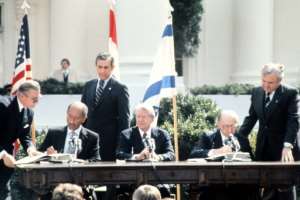
Four decades ago the leaders of Israel and Egypt reached a deal at an epic summit that led to the first peace treaty between the Jewish state and an Arab nation.
The Camp David Accords, thrashed out over days of talks hosted by then US president Jimmy Carter, were signed on September 17, 1978.
Here is a look back at that key moment in history.
Series of wars
In 1973, Egypt and Syria launch a surprise attack on Israel with the aim of forcing it to return territory seized from them in 1967.
Egypt makes a significant advance, even though it is eventually repelled.
 Menachem Begin (right) and Anwar Sadat on November 20, 1977 in Jerusalem. By (FILES-IPPA/AFP/File)
Menachem Begin (right) and Anwar Sadat on November 20, 1977 in Jerusalem. By (FILES-IPPA/AFP/File) Empowered, it agrees to attend a peace conference called in December in Geneva under the auspices of the United States and Soviet Union.
It brings Israelis and Arabs together for direct negotiations for the first time. Syrians and Palestinians do not attend, however, and the meeting adjourns.
First Arab leader in Israel
On November 9, 1977 Egypt's president Anwar Sadat announces -- to the general surprise of all -- that he is prepared to visit Israel in a bid for peace.
"I am ready to go to the end of the world if this would prevent the wounding, let alone the killing, of a soldier or an officer," he says.
 Anwar Sadat (left) and Menachem Begin (right) signing the Israel-Egypt Peace Treaty in Washington in the presence of Jimmy Carter (centre) on March 26, 1979. By - (FILES-CONSOLIDATED NEWS PICTURES/AFP/File)
Anwar Sadat (left) and Menachem Begin (right) signing the Israel-Egypt Peace Treaty in Washington in the presence of Jimmy Carter (centre) on March 26, 1979. By - (FILES-CONSOLIDATED NEWS PICTURES/AFP/File) After receiving a formal invitation from Israeli prime minister Menachem Begin, Sadat arrives in Jerusalem on November 19, making the first visit by an Arab head of state to the Jewish nation.
Sadat shakes hands with his foes in the Israeli leadership and calls for a "just and permanent peace" in the entire region.
But it takes 10 more months of tough diplomatic exchange before further negotiations can take place.
Agreement at Camp David
In August 1978, Carter invites Sadat and Begin to meet in the United States.
Their summit gets underway on September 5 at Camp David, the presidential weekend retreat 100 kilometres (60 miles) from Washington, in a forested area with about 20 chalets.
For 13 days the three talk, surrounded by their diplomatic and military advisors, cut off from the rest of the world.
They sketch out and discuss 23 versions of an eventual peace accord, making countless revisions.
The negotiations continue into the night and at times the summit teeters on the edge of breakdown. Carter is in a constant back-and-forth between Sadat and Begin.
Eventually, it all comes together.
Warm embrace
Sadat and Begin sign the Camp David Accords on September 17, a determined Carter pushing negotiations until the very last minute. The two foes embrace, stunning the world.
There are two documents: the "Framework for Peace in the Middle East", which outlines the basis of a peace settlement between Israel and its Arab neighbours, and "Framework for the Conclusion of a Peace Treaty between Egypt and Israel".
Included are "side letters" confirming that Egypt and Israel remain in disagreement on the status of the holy city of Jerusalem and on the future of the West Bank and Gaza Strip.
From Nobel to assassination
Other Arab nations are enraged with Egypt, believing that the truce agreed by the military and political heavyweight, also the historical leader of pan-Arabism, has upended the regional balance of power in favour of Israel.
They protest that the deal ignores the Palestine Liberation Organisation and the rights of the Palestinian people.
In November, Sadat and Begin win the Nobel Peace Prize for their efforts at Camp David.
In Washington on March 26, 1979, they sign the first Arab-Israeli peace treaty, which sets the terms for Egypt recovering the Sinai from Israel in 1982.
Arab countries slam the treaty as a "separate peace" and a betrayal, and break off relations with Egypt, suspending it from the Arab League.
Sadat, also criticised in his own country, is assassinated in October 1981.
In 1994, Jordan becomes the second Arab nation to normalise ties with Israel.
Read Full Story




















Facebook
Twitter
Pinterest
Instagram
Google+
YouTube
LinkedIn
RSS